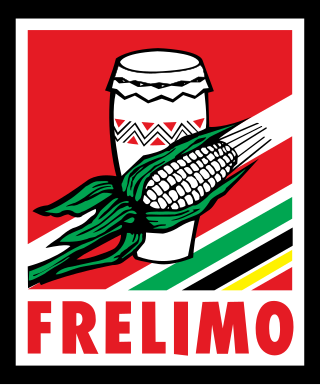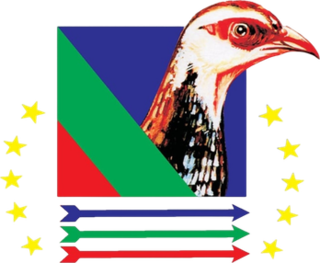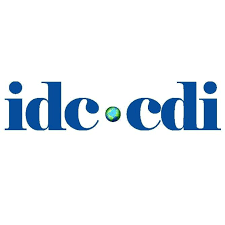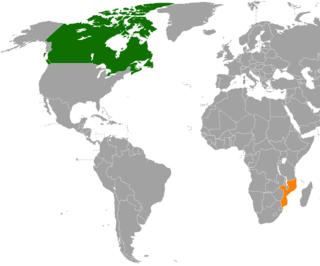Pascoal Manuel Mocumbi was a Mozambican politician who served as Prime Minister from 1994 until 2004. His traditional name was Mahykete.

FRELIMO is a democratic socialist political party in Mozambique. It has been the country's ruling party since 1977.

RENAMO is a Mozambican political party and militant group. The party was founded with the active sponsorship of the Rhodesian Central Intelligence Organisation (CIO) in May 1977 from anti-communist dissidents opposed to Mozambique's ruling FRELIMO party. RENAMO was initially led by André Matsangaissa, a former senior official in FRELIMO's armed wing, and was composed of several anti-communist dissident groups which appeared immediately prior to, and shortly following, Mozambican independence. Matsangaissa, who died in 1979, was succeeded by Afonso Dhlakama, who led the organization until he died in 2018. He was succeeded by Ossufo Momade.
The RENAMO-Electoral Union is an alliance of political parties in Mozambique, led by the Mozambican National Resistance of Afonso Dhlakama.
Luís Bernardo Honwana is a Mozambican author and statesman.

The Mozambican Football Federation is the governing body of football in Mozambique. It was founded in 1975, affiliated to FIFA in 1980 and to CAF in 1978. It organizes the national football league Moçambola and the national team.

The Armed Forces for the National Liberation of East Timor originally began as the military wing of the Fretilin party of East Timor. It was established on 20 August 1975 in response to Fretilin's political conflict with the Timorese Democratic Union (UDT).

The Centrist Democrat International is a centrist political international inspired by the values of Christian Democracy. Until 2001, it was known as the Christian Democrat International (CDI); before 1999, it was known as the Christian Democrat and People's Parties International. This earlier name is still sometimes used colloquially.

Marcelino dos Santos was a Mozambican poet, revolutionary, and politician. As a young man he travelled to Portugal, and France for an education. He was a founding member of the Frente de Libertação de Moçambique, in 1962, and served as the party's deputy president from 1969 to 1977. He was Minister of Economic Development in the late 1970s, Frelimo Political Bureau member in charge of the economy in the early 1980s, Chairman of the country's parliament, the Assembly of the Republic, from 1987 to 1994, and, as of 1999, remained a member of the Frelimo Central Committee. He represented the left wing of the party, remaining an avowed Marxist-Leninist, despite the party's embrace of capitalism in recent decades, an embrace which dos Santos declared was temporary.

The National Council of Maubere Resistance was an umbrella organisation of East Timorese individuals and organisations dedicated to resisting the Indonesian occupation of 1975–1999.

Christianity is the largest religion in Mozambique, with substantial minorities of the adherents of traditional faiths and Islam.

Filipe Jacinto Nyusi is a Mozambican politician serving since 2015 as the fourth President of Mozambique. He is the current leader of FRELIMO, the party that has governed Mozambique since its independence from Portugal in 1975. Additionally, he has served as the Chairman of the Southern African Development Community since August 2020. During his time in office, President Nyusi has promoted peace and security, and signed multiple agreements with the main opposition parties, RENAMO, to bring a definitive and lasting peace to Mozambique.

Resistencia Nacional was a Salvadoran political party. It began as a revolutionary organization founded on March 10, 1975, which became part of the FMLN coalition in 1980, against the military junta in the Salvadoran Civil War.
The National Popular Resistance Front or National People's Resistance Front, frequently referred to as the National Resistance Front, is a wide coalition of Honduran grassroots organisations and political parties and movements that aims to restore elected President Manuel Zelaya and hold a constituent assembly to draw up a new constitution.

Canada–Mozambique relations are the interactions between the countries of Canada and Mozambique. These relations began in 1975 after Mozambique became an independent country. Since gaining independence, Canada and Mozambique have engaged in peaceful diplomatic relations.

Orlando Marques de Almeida Mendes was a Mozambican biologist and writer.

The Mozambican Athletics Federation is the governing body for the sport of athletics in Mozambique.

General elections were held in Mozambique on 15 October 2019. During the leadup to the elections, assassinations and significant intimidation of prominent leaders of opposition parties and election observers were alleged. In addition, state resources, media, and aid for cyclone victims were also alleged to be used in favour of the ruling party (FRELIMO) and its candidates. Local elections observers, civil society organizations, the Commonwealth Observer Group, the European Union Election Observation Mission, and several national and international entities classified the elections as rigged. Nevertheless, the incumbent president Filipe Nyusi of FRELIMO was declared re-elected with 73% of the vote. The main opposition party RENAMO as well as the other oppositions parties involved in the elections contested the results, claiming there were numerous irregularities, and accusing FRELIMO of "massive electoral fraud", including hundreds of thousands of "ghost voters". As evidence for the international community, Ossufo Momade, the president of the main opposition party RENAMO, transported to Europe a box filled with vote ballots that had been marked in favor of the incumbent president Filipe Nyusi of FRELIMO before the commencement of voting. Despite these occurrences, the international community largely ignored any concerns of fraud, and gradually countries started recognizing the incumbent president Filipe Nyusi of FRELIMO as the winner of the elections.
The Organization of Mozambican Women is the women's section of FRELIMO. Founded in 1973, during the Mozambican War of Independence, in recognition of women's growing roles in the conflict against Portuguese colonialism, the OMM was created as a non-military structure to promote women's education, emancipation and mobilization. Following independence in 1975, the OMM focussed on issues related to women's education, ethnic division, divorce, family planning, adultery and promiscuity, prostitution, and alcoholism. In 1990, the OMM voted to separate from FRELIMO, although shortly thereafter, the organization re-affiliated.
Civil society is often loosely defined as independent organizations that form out of mutual interest and can act to influence the state. The degree of autonomy that civil society groups enjoy from the state reveals the extent to which the public sphere can act on its own to impact government policy, and as such is a helpful metric of democratization within a state. In Lusophone African countries, democratization varies considerably across borders; in 2021, of all the member states of the African States of Portuguese Official Language (PALOP), only São Tomé and Príncipe and Cape Verde were ranked "Free" on the Global Freedom Score by Freedom House, while Guinea-Bissau and Mozambique were classified as "Partly Free" and Angola and Equatorial Guinea as "Not Free". Though variations exist, conditions for civil society organizations in these states are often influenced by a common violent past, as independence from Portugal often came as a result of liberation wars followed by civil conflict.